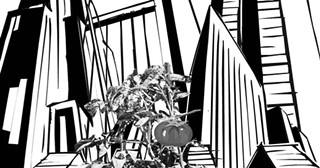"You can see the greens thriving, almost ready for harvest," Elizabeth Peirce says, pointing at her raised beds of arugula and spinach. "These tomatoes are starting to bloom." She gently fingers the budding yellow flower. "Beauty."
She's giving me the tour of her Kline Street backyard, one of her three peninsular gardens. She has another, on her mother's property, a quick triple jump to Linden Street, where Hurricane Juan removed seven trees that blocked the sun until 2003. The third is in her friend's yard in Clayton Park. "I get some great looks on the bus with my shovel and big hat," she chuckles.
Peirce works them all and sells the produce to seven members of Halifax peninsula's first community-supported agriculture scheme. Her inspiration was Jean Snow, who founded Lake City Farm in Dartmouth in 2008 and sells produce to 14 families and a few restaurants. "She's a pioneer," Peirce says. "People didn't think it was possible to grow sustenance in Dartmouth."
Snow has a team of volunteers to help manage three gardens while learning about urban agriculture. Peirce was one of those volunteers last year. "Jean used to sell at the Farmers' Market," she says, "but she's not a morning person."
The sales at the market are unpredictable, dependent on weather and the mood of shoppers. With community-supported agriculture, where members buy in at the start of the season, farmers know how much food to grow and what their returns will be.
Peirce learned the ins and outs of community-supported agriculture from Snow, but her green thumb goes back generations. "We used to call my grandpa the human rototiller," she recalls. "He bagged the little finger-width thinned-out carrots and sold them as cocktail treats." A man ahead of his time---Nova Scotia still doesn't produce any local baby-cut carrots.
Peirce's grandparents were the first to leave the family farmland in the valley, but they never quit gardening. She feels "genetically predisposed" toward agriculture. "My earliest memory is following Grandma picking potatoes we sold from the back of a '63 Ford Fairlane whale car in Truro," she says. She's been a gardener since she learned to walk in Tatamagouche.
A few decades later, as a west-end Haligonian, a professional editor and writer (she just released an organic gardening book with Nimbus Publishing and has a couple pirate books out) and professor of English, Peirce straddles the metaphysical rural-urban divide. In her ideal world, she'd live on a farm, but with an engineer for a partner full-scale farming isn't feasible.
She's content living in a city she enjoys, connecting seven small Haligonian families to food grown only blocks away. Her produce requires almost no fossil fuels---she even delivers the weekly food boxes by bicycle. For $15 a week she brings her members a variety of peas, beans, berries, tomatoes, herbs, potatoes, greens and squash. It doesn't earn her much, but it covers the cost of seeds.
"I only wish I could have a few chickens, maybe a goat," she says.
Even at this scale, the endeavour has its challenges. Like much Halifax soil, Peirce's tested high in lead. "In the old days people used to throw their coal ash into the yard," she says. Lead is stagnant, it never goes away. She dug the soil up and replaced it with fresh organic topsoil from Bridgewater.
Then there are the cats. Peirce surrounded the whole garden with netting and put barriers around individual plants. "Still the little things get in and do their business. Cats are the worst things about urban gardening."
Despite the challenges Peirce hopes to expand a little each year. She shows me a shed-like new building in the back of the yard. "This will be the greenhouse." Soon she'll provide greens year round and prepare seedlings earlier in the season.
At most, Peirce could serve 20 members. It's a drop in a massive bucket of Halifax's food needs, but she expects to see more people growing and selling urban local food. "Spryfield was once the Halifax breadbasket," she says, "until it was re-zoned and sold off for development. Farms are still being sold off. You can't get that land back and people want local food---it has to come from somewhere."












